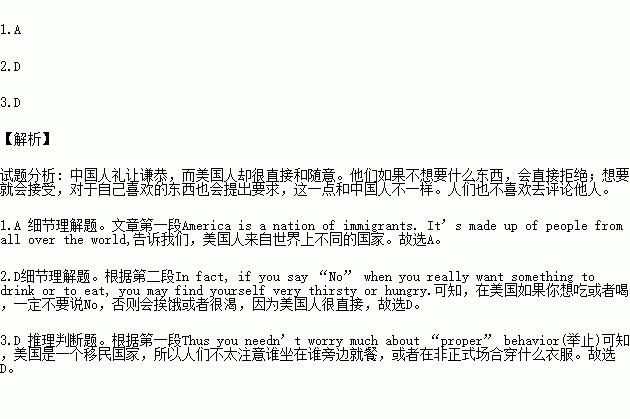题目内容
Most Westerners—particularly most Americans—are not nearly as concerned about protocol (礼节) in social matters as Chinese people are. America is a nation of immigrants. It’s made up of people from all over the world, all of whom bring their own traditions and habits with them. Thus you needn’t worry much about “proper” behavior(举止):who sits next to whom at the dinner table, what is the suitable dress for the occasion, etc. , unless you receive a formal invitation to a dinner or party.
Americans are very direct people. When you want something you say “Yes” and when you don’t, you say “No”. If you want something different from what is offered, you ask for it. Westerners will not ask you again and again or try to press something on you after you have said you don’t want it. In fact, if you say “No” when you really want something to drink or to eat, you may find yourself very thirsty or hungry.
But there are a few Western customs which are very important and you should try at all times to observe.A Westerner doesn’t leave his paper or cloth on the table. He puts it on his lap where it’s supposed to protect his clothes from spilled food or uses it to wipe his hand or mouth when necessary.
A Westerner doesn’t put his own fork, knife or spoon into a serving bowl. He uses it in the bowl to put some of the food on his own plate, and then returns the serving fork(knife or spoon) to the bowl.
A Westerner doesn’t spit food anywhere. If he has bones in his mouth, he takes them out with his fingers and places them on the edge of his plate, never on the table or floor.
A Westerner doesn’t belch(打嗝) out loud. If he does, he says “Excuse me” quietly and goes on with the conversation.
1.People in America __________.
A. come from different countries in the world
B. mainly come from Europe
C. mainly come from Asia
D. come from China
2.If you are hungry, and you still say you don’t want to eat, then __________.
A. a Westerner will ask you again and again
B. you will be forced to eat
C. you will feel glad and happy
D. you will surely find yourself hungry still
3.According to the passage, Westerners __________.
A. care what they wear very much
B. care who offers the first toast at dinner
C. do the same things as Chinese do
D. don’t care what you wear, who sits next to whom
 阅读快车系列答案
阅读快车系列答案
